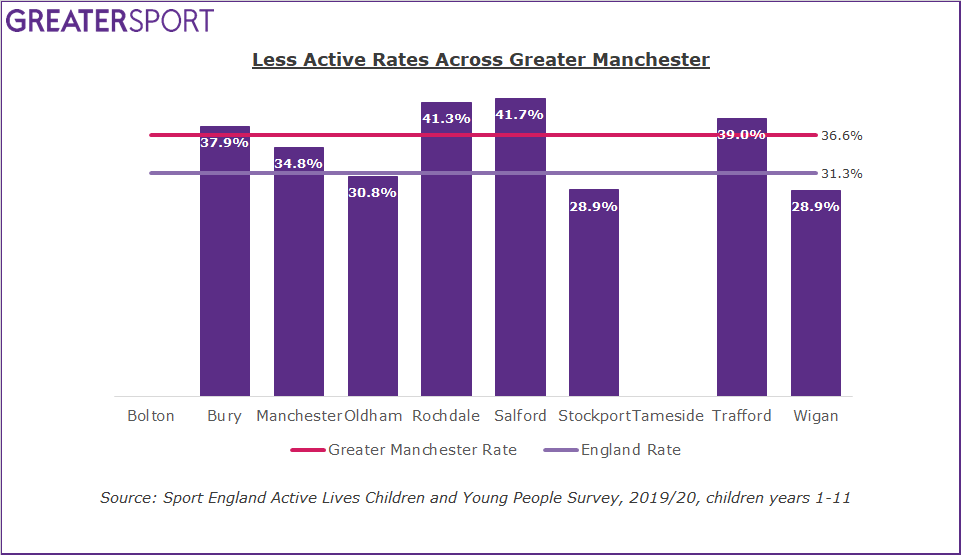Oldham Children & Young People Activity Levels 2019/20
In Oldham 49.1% of children and young people are achieving an average of 60 minutes of physical activity a day. This means that half are not meeting Chief Medical Officer guidelines.
Please note that the borough level data should be interpreted with caution, Covid-19 had a significant impact on data collection and the caveats for the data can be found below.
Activity Levels Amongst Children and Young People in Oldham

The Chief Medical Officer (CMO) recommends that all children and young people achieve 60 minutes of physical activity a day, in Oldham half of young people achieve this. Concerningly, three in ten do not even achieve 30 minutes of physical activity every day, however, this is below both the National and Greater Manchester (GM) average for less active.

The proportion of children moving (achieving an average of at least 30 minutes physical activity a day) in Oldham has seen a significant increase (+14.6%) since the Active Lives Children and Young People Survey launched in 2017/18. Whilst we have no data from last year to compare to we know that at a national level Covid-19 had a significant impact on activity levels and has particularly affected those from urban areas and areas of high deprivation, both of which are prevalent in Oldham.
Children and Young People in Oldham
The levels of physical activity in Oldham are important because:
- One in four (23.0%) children leave primary school overweight or obese, we know that physical activity has a role to play in these figures and this was highlighted by the Chief Medical Officer with active travel and physical activity being highlighted as approaches to tackle childhood obesity.
- Two in five (39.9%) children are classified as living in poverty in Oldham (after housing costs) according to End Child Poverty. The Active Lives Survey shows us that those young people from less affluent households are more likely to be less active.
Data Caveats
- Some of the data has been suppressed because they have less than 150 responses in total or only 1-2 responding schools in the Local Authority meaning the data is insufficiently reliable
- Whilst there may be a change compared to baseline (2017/18) or last years release (2018/19) the reliability and validity of assessing change is affected by the fact that certain school phases or terms may be missing within the data.
Activity levels differ by term, and so where you are not comparing like for like the result will be different due to the profile, not solely through a genuine change – if there is a genuine change this will be hard to unpick. In the case of large changes you might assume the scale is exaggerated but the direction is likely, with smaller changes we would recommend not relying on these. The same applies with school phases.
February 2020
